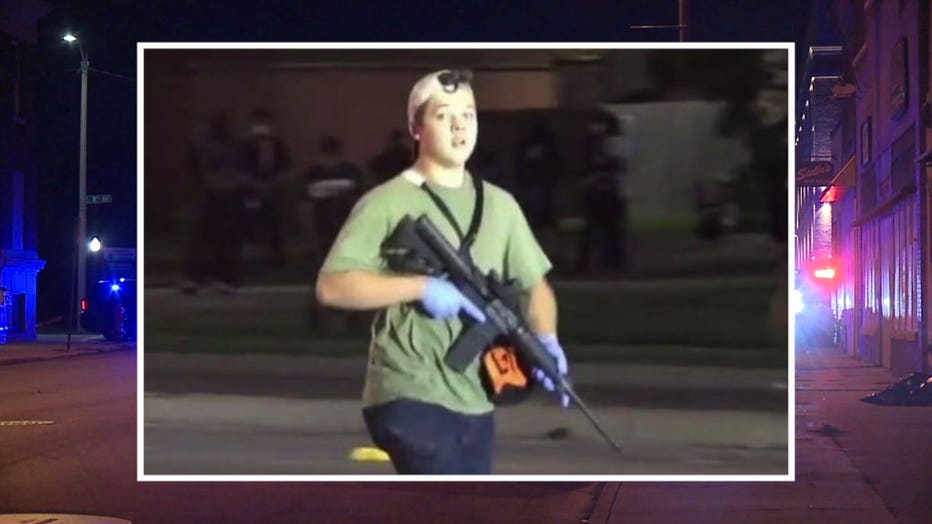Kyle Rittenhouse appears in Wisconsin court, bail set for $2M

Kyle Rittenhouse appears in Kenosha County court
After his Friday extradition from Illinois, 17-year-old Kyle Rittenhouse appeared in Kenosha County court.
KENOSHA, Wis. - A Wisconsin court commissioner on Monday set bail for an Illinois 17-year-old accused of killing two people during a protest at $2 million, setting aside pleas from one victim's father to double that amount.
Kenosha County prosecutors have charged Kyle Rittenhouse of Antioch, Illinois, with fatally shooting Joseph Rosenbaum and Anthony Huber during a protest over a police shooting in August. They've also charged him with wounding a third man, Gaige Grosskreutz.
Rittenhouse turned himself in to police in Antioch the morning after the shootings. Rittenhouse was extradited to Wisconsin on Friday and made his initial court appearance in Kenosha County on Monday afternoon.
His attorney, Mark Richards, asked Court Commissioner Loren Keating to set bail at $750,000 and place Rittenhouse on electronic monitoring. Prosecutors asked Keating to set bail at $2 million, saying Rittenhouse has every reason to flee.
John Huber, whose son, Anthony, was one of the two people killed, made an emotional appeal for the judge to go much higher than the $2 million the state sought.

Kyle Rittenhouse
The ruling and speedy transfer came several hours after a hearing Friday morning in which Judge Novak heard arguments for and against extradition.
The shootings happened Aug. 25, two days after a white police officer trying to arrest Jacob Blake shot the 29-year-old Black man seven times in the back, paralyzing him from the waist down. Video of the police shooting sparked outrage and helped spur on the protests.
Rittenhouse’s case has become a rallying point for some conservatives who see him as a patriot who was exercising his right to bear arms during unrest. Others portray him as a domestic terrorist who incited protesters by showing up wielding a rifle.
At Friday's hearing, Rittenhouse's lawyer said he had a change of heart since notifying the court that he planned to call witnesses, including Rittenhouse’s mother. Instead, John Pierce focused on what he called “fatal defects” in extradition papers.
A local prosecutor said the law is unambiguous in requiring Rittenhouse’s extradition.
“You can imagine the chaos if someone can commit a crime and step over the (state borderline) and get sanctuary,” Lake County Assistant State’s Attorney Stephen Scheller told Novak.
FREE DOWNLOAD: Get breaking news alerts in the FOX6 News app for iOS or Android
Rittenhouse sat at a defense table wearing a dress shirt and tie — mask across his face. At least once, he turned to look at his mother, Wendy Rittenhouse, on a spectactors’ bench. Later, as officers led him from the hearing room, she began to cry.
In his ruling, Novak said an extradition to another state can be halted only under several clear conditions, including if the extradition papers aren’t in order, if a suspect hasn’t yet been charged or if the identity of the suspect is in doubt. He said none of those conditions applied.
Without witnesses from either side, the part of Friday's hearing meant for evidence and testimony lasted less than 30 seconds, when Scheller handed the judge Illinois Gov. J.B. Pritzker's signed warrant calling for Rittenhouse’s extradition.
Pierce told Novak that Wisconsin authorities were required by law to present charging documents to a magistrate judge and that their failure to do so rendered their extradition request invalid.
Novak dismissed that argument, saying in his ruling that Rittenhouse’s lawyers offered no evidence that a magistrate judge did not review the charges.
“Even if this court were to find the complaint (was) not made before a magistrate … Rittenhouse’s argument would still fail,” he wrote. The warrant signed by Pritzker, he said, “satisfies all the requirements."
The most serious charge Rittenhouse faces in Wisconsin is first-degree intentional homicide, which carries a life prison sentence. He is also charged with attempted intentional homicide in the wounding of a third protester, as well as a misdemeanor charge of underage firearm possession. His lawyers have argued he was acting in self-defense.
Rittenhouse and the man he allegedly injured are white, as were the two men who were killed.
A day after the shooting, Rittenhouse surrendered to police in his Illinois hometown of Antioch, around 10 miles (16 kilometers) southwest of Kenosha. The Milwaukee Journal Sentinel, citing an arrest report it went to court to obtain after its public records request was denied, reported Friday that Rittenhouse turned himself in less than two hours after the shooting and told an officer he had “ended a man's life.”
The report said firefighters were called when Rittenhouse — described as alternating between calm, fits of crying and vomiting — had trouble breathing at one point. The newspaper also said Rittenhouse told police the rifle used in the shooting was in the trunk of a friend's car.
According to prosecutors and court documents, Rittenhouse killed 36-year-old Joseph Rosenbaum, of Kenosha, after Rosenbaum threw a plastic bag at Rittenhouse, missing him, and tried to wrestle his rifle away.
While trying to get away in the immediate aftermath, Rittenhouse was captured on cellphone video saying, “I just killed somebody.” According to a complaint filed by prosecutors, someone in the crowd said, “Beat him up!” and another yelled, “Get him! Get that dude!”
Video shows that Rittenhouse tripped. As he was on the ground, 26-year-old Anthony Huber, of Silver Lake, hit him with a skateboard and tried to take his rifle. Rittenhouse opened fire, killing Huber and wounding Gaige Grosskreutz, of West Allis, who was holding a handgun.
Featured
Kyle Rittenhouse extradited to Wisconsin after Illinois judge’s ruling
An Illinois judge on Friday ordered the extradition of a 17-year-old accused in the fatal shooting of two demonstrators in Kenosha, Wisconsin.


